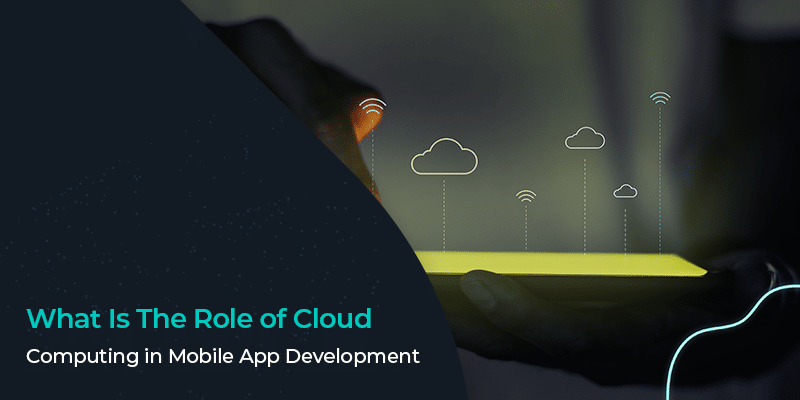Introduction
Mobile applications have emerged as essential components in daily life because they handle tasks across social communication to purchasing and money management needs. The accelerated mobile app growth motivates developers to discover new means of optimizing speed together with scalability and protection measures.
Cloud computing stands as the most advanced technology that transforms mobile application development processes. Cloud-based solutions offer businesses the chance to optimize their operations while minimizing infrastructure expenses at the same time they deliver enhanced user experience.
The core functions of cloud computing consist of automatic data synchronization and instant updates along with support between various device platforms which makes it essential for developing contemporary applications.
What Are The Benefits of Cloud Computing in Mobile App Development
Unmatched Scalability and Adaptability
Cloud-based mobile applications provide automatic scalability through which they meet growing user needs without needing major adjustments to infrastructure systems. Current cloud service systems automatically adjust capacity according to the rate of user growth or traffic flow spikes. The ability to adapt ensures applications perform without performance interruptions and latency problems.
Significant Cost Savings and Resource Optimization
Developing mobile apps traditionally demands significant financial resources for maintaining physical servers alongside infrastructure upkeep costs. Cloud computing services remove these charges through its virtualized storage solutions with usage-based billing. UK developers usually manage resources properly so operational costs decrease without impacting performance quality.
Accelerated Development and Seamless Deployment
Cloud technology simplifies mobile app development processes because it provides developers with development tools and frameworks together with automated testing platforms. The process from prototype design to debugging to deployment happens faster due to this feature thus decreasing time-to-market for the app developers.
Enhanced Cross-Platform App Compatibility
Cloud computing stands out as a powerful solution for every app development company because it provides mobile apps with support for various operating systems and devices. Cloud-based applications function without limitations from specific platforms which allows users to enjoy a continuous experience between iOS and Android and their corresponding web browser systems without needing extra updates.
Robust Security and Data Protection
The protection of mobile applications remains essential during development so cloud service providers follow strict security protocols to defend critical data. End-to-end encryption combined with multi-factor authentication standards based on industry regulations ensures mobile applications will stay protected against cyber threats and data breaches.
Reliable Data Storage and Automated Backup
The automatic protection and safe storage through cloud computing solutions minimize catastrophic situations from mobile applications losing data. Cloud databases safeguard the integrity of data through their automatic recovery capabilities which provide immediate access after systems failures or cyberattacks and accidental file removal.
What Are The Challenges of Cloud Computing in Mobile App Development
Internet Dependency and Connectivity Issues
Cloud-based applications need stable internet connectivity to operate effectively throughout their work cycle. Users who reside in locations without strong network infrastructure or who live in remote areas risk facing problems while trying to access cloud-hosted applications. Users face interruptions to program performance and limited capabilities as well as total blocked access during times of weak or absent internet connection.
Security Risks and Data Vulnerabilities
Security measures deployed by cloud service providers like firewalls encryption methods and access controls do not eliminate cyber threats against their cloud-based applications. Hacker groups take advantage of unfixable weaknesses to break into protected data resulting in security breaches of user information.
Compliance with Data Privacy Regulations
Companies that operate their data storage solutions through cloud infrastructure need to fulfill GDPR and HIPAA data protection requirements along with other applicable regulations. The non-compliance with legal requirements leads both to extreme sanctions and negative impacts on businesses’ reputations.
Latency and Performance Delays
Cloud applications use internet-based transmission which connects client devices to remote servers. The combination of network overloading improperly placed servers and extended transmission paths generates performance delay which degrades application speed and causes users to face frustrating delays.
Complexity in Integration with Existing Systems
Moving legacy applications to the cloud while merging cloud services with enterprise systems requires complicated actions and takes extensive time to complete. The combination of compatibility problems and data migration complexity alongside architectural discrepancies needs full workflow modifications for existing systems.
Risk of Service Downtime and Disruptions
Mobile applications suffer from performance problems due to unexpected downtime experienced by their cloud service providers which results in temporary service interruption and poor user satisfaction. Leading cloud service providers guarantee system availability but their services might still encounter technical failures, cyberattacks, and scheduled maintenance.
Conclusion
Cloud computing gives developers the possibility to build advanced applications with superior performance while responding to the continuously changing needs of digital consumers today.



